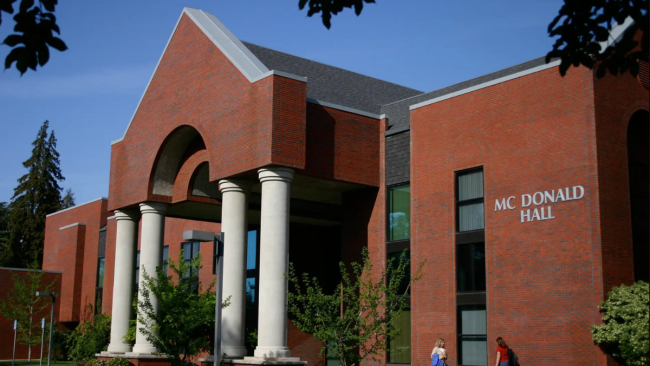You have /5 articles left.
Sign up for a free account or log in.

Fresno Pacific University
As congressional and state Republicans explore ways to block President Biden’s loan-forgiveness plan, one Christian college is touting its benefits for students.
Fresno Pacific University officials said in a recent news release that $63.2 million of the $79.3 million in federal loans taken out by nearly 5,300 students since 2018 would be forgiven through Biden’s plan, describing the plan as a “helpful boost.”
The university hasn’t always aligned with the Biden administration. The Mennonite Brethren–backed university in central California last year rejected a request from students to form an LGBTQ group on campus, and the Biden administration has supported LGBTQ rights.
Still, Fresno Pacific is one of the few Council of Christian Colleges and Universities member institutions to explicitly support the debt-relief plan and break down how it would affect students and alumni. The council didn’t respond to a request for information about its stance on the debt-relief plan or what other members have said.
The Biden administration said last month that it will forgive up to $20,000 in federal student loans for those who received a Pell Grant while in college and up to $10,000 for those who are making less than $125,000 per year. Republican lawmakers and other groups have criticized the plan as an overreach of executive authority and a taxpayer-funded handout.
The plan is expected to wipe out millions in debt for up to 43 million Americans who have federal student loans. More information will be released in the coming weeks about how borrowers can apply for debt relief, the U.S. Department of Education said Tuesday.
At Fresno Pacific, the plan will forgive 79.7 percent of students’ debt and 84.7 percent of the debt held by those who received Pell Grants. Again, the university’s analysis only included students and alumni who took out loans in the last four years, but Biden’s plan affects any loan disbursed before June 30 of this year.
Jon Endicott, vice president of enrollment management and student services at Fresno Pacific, said university administrators wanted to check the numbers in order to gauge the impact of the plan. He was surprised by the results.
“By both the number of students and the total amount being in the millions,” he said, “it really did feel like this was a significant program for current students and alumni, recognizing the significance and what that might mean toward being able to buy a house sooner or being able to be more financially secure for a family’s future.”
Endicott said administrators were somewhat concerned about wading into the politics of loan forgiveness.
“We’ve always said that we’re here to serve our students,” Endicott said. “From our standpoint, the reason that we simply went with the results of what the numbers are was an attempt to try to just rise above that … and be able to talk about the benefit of that, and not get into the politics of ‘was this politically motivated?’ or why this came about.”
A Fresno Pacific student typically graduates with about $23,219 in federal student loans to repay, according to U.S. Department of Education data. The national average for students who take out loans is $36,510. Among the group studied, the students borrowed $15,080 on average, while Pell Grant recipients borrowed an average of $15,553, according to Fresno Pacific data.
Most Fresno Pacific students receive financial aid, and two-thirds came from low-income households. About half are first-generation college students.
The university noted in its release that student loans have a greater impact on graduates of color and those from low-income households as well as those starting out in a career.
“These are the very students who attend FPU in the greatest numbers,” FPU president André Stephens said in the release. “Even a modest debt at this time in their lives can have a lasting effect that makes it harder for them to enjoy the well-documented economic and social benefits of higher education. College debt can be debilitating just at the time graduates should be building success for themselves, their families and their communities.”
Endicott said he’s hopeful the loan-forgiveness plan, along with the other proposed changes to income-driven repayment, will provide alumni and current students with a more positive view of their bachelor’s degree. He expects the university to send out more information to alumni about the next steps to take in order to receive the debt relief.
“Hopefully it means that our alumni can see the financial benefits of their college degree instead of their bachelor’s degree feeling like it was something that just put them into debt,” he said.




